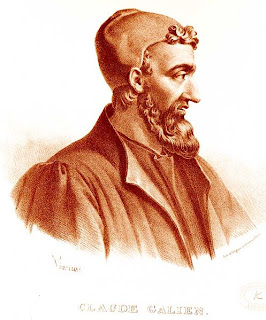Galen was a philosopher who lived from 130-200 CE. His high levels of education helped shape medicine as we see
it today.
He studied the human skeleton and the practice of autopsy in Egypt and studied anatomy by the dissection of monkeys and other animals. Galen’s first career as a surgeon was in Rome, where he became a surgeon to the gladiators.
Galen, as a pluralist, dealt with the
four elements of earth, air, fire and water and the theories of hot, cold, wet
and dry in order to describe the material of mixtures. This was used for drugs
in order to counteract the natural fluids of the body. Galen continued his study of biological science research from studying other
great philosophers such as Aristotle and Plato.
Galen’s most influential practice was
his discovery of the Hippocratic theory involving the four humors: phlegm, blood,
black bile and yellow bile. These four human body fluids needed to be in
perfect harmony otherwise the emotional level will be off and the patient will
become ill. Sanguine (blood), Choleric (yellow bile), Melancholic (black bile),
phlegmatic (phlegm).
·
If there was too much blood the body will be
cheerfully optimistic
·
If there is too much yellow bile the body will
be bad-tempered or irritable
·
If there is too much black bile the body will be
deep, pensive, and sad
·
If there is too much phlegm the patient will be
calm and unemotional
William Harvey displaced this theory with the theory of the systematic circulation of blood that is still utilized today.
WebMD Symptoms:
Overly excited: excess blood
Prescribe leeches to reduce amount of blood in the body.
---Side effects: decrease in white blood cells which inhibits ability to fight diseases which can lead to death
Prescribe leeches to reduce amount of blood in the body.
---Side effects: decrease in white blood cells which inhibits ability to fight diseases which can lead to death
Angry/crazy: excess yellow bile
Prescribe hellebore supposed to cure madness. It is a poisonous winter-flowering Eurasian plant of the buttercup family, typically having 5 leaves and large white greenish, purplish flowers.
---Side effects: vertigo, stupor, extreme thirst, feelings of suffocation, swelled tongue and throat, vomiting, eventual death by cardiac arrest
Prescribe opium: a reddish brown heavy scented addictive drug prepared from the juice of opium poppy. It is used as a narcotic and medicine in analgesic.
---Side effects: inability to feel pain; painlessness
Sad: excess black bile
Prescribe scammony weed (plant of the morning glory family, the dried roots which yielded a strong purgative). Make into a juice to be consumed.
---Side effects: too much juice equals vomiting which can lead to death
Unemotional: excess phlegm
Prescribe Aurum Potabile (drinkable gold) supposed to give you longevity, energy, youth and beaut
---Side effects: neurological disorders, cancer, and susceptible to infections.
---Side effects: neurological disorders, cancer, and susceptible to infections.
Prescribe mercury or quicksilver (liquid form of mercury).
---Side effects: mood changes. Able to quickly change your mood
Other Medical Practitioners during Harvey's Time
During medieval times and through the 1600s it was common for barbers, who were adept with scissors, to apply their knowledge to more dangerous occupations such as surgery. As such, they were known by the simple title “barber-surgeon.” Often working on battlefields, they were also found in cities like London and rarely had much formal training. Additionally, apothecaries were often given the same trust as physicians and regularly prescribed remedies to the sick. Yet, like the barber-surgeons, they had little to no training and could easily kill their patrons with a miscalculated prescription. In May 1616 William Harvey and a number of other physicians begged King Charles I to place heavy restrictions on apothecaries. The King agreed and issued forth a decree limiting them. This included not allowing apothecaries to prescribe anything a physician had not already approved for the patient. Yet, this was a difficult rule to enforce and it was estimated that only 30 out of the 150 apothecaries complied with the new law at the time. Furthermore, nobles continued to have a personal apothecaries in their homes to take care of their family.

No comments:
Post a Comment